Author Archive
Watch Rocket Marching Band’s Virtual Performance in Glass Bowl Sept. 12
Thursday, September 10th, 2020In the absence of football on what would’ve been the first home game of the season, The University of Toledo Rocket Marching Band will make its 2020 performance debut virtually from the Glass Bowl with custom-made masks and socially distant field formations.
“Saturday Sounds of the Stadium” will be live-streamed starting at noon Saturday, Sept. 12 on the band’s Facebook page, with more virtual performances to be scheduled throughout fall semester.
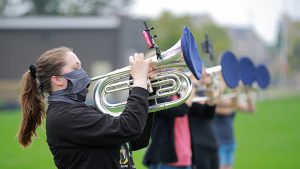
Lauren Weinberg plays the baritone during rehearsal for the virtual “Saturday Sounds of the Stadium” event. On what have been the first home football game of the season, Rocket Marching Band will instead make its performance debut live-streamed on the band’s Facebook page starting at noon Saturday, Sept. 12.
“Having the opportunity to continue to perform and make music with the Rocket Marching Band is truly a blessing,” Ashley Venrick, a senior at UToledo majoring in music education and one of the drum majors, said. “We were unsure if we would be able to perform at all, and to know it’s actually happening this weekend lifts everyone’s spirits.”
Though the seats in the Glass Bowl will be empty, Rocket Nation can watch from anywhere around the world as the Rocket Marching Band performs music and choreography from its traditional pregame show alongside longtime UToledo standards and Rocket fan favorites.
But the performance will look different as the 175 students follow safety precautions advised by the Centers for Disease Control and Prevention to prevent the spread of COVID-19.
“As one of the more visible ambassadors for The University of Toledo, we want to set an example for how we can all ignite our tradition of campus and community pride, while maintaining low-risk operation,” said Tiger Rhodes, associate director of bands, director of athletic bands and associate lecturer of low brass in the UToledo Department of Music. “We have creative and adaptable students and staff who are able to generate unique performance opportunities.”
The band practices exclusively outdoors, rehearses in small groups for 30-minute blocks, and masks the staff, students and instruments.
Instead of standing shoulder-to-shoulder, band members are spaced a minimum of 7.5 feet apart — at least four steps.
They wear face masks, including specially crafted masks with a small slit for mouthpiece access that allow students to play wind instruments.
Plus, fitted bell covers are used as “masks” for all wind and brass instruments to prevent the spread of germs.
Rhodes said he worked closely with CLDesigns in Sylvania to create the blue bell covers as well as a mask with a horizontal overlap to allow for a horn to reach the student’s face while also providing the player coverage when the horn is down.
“We are thankful to have the opportunity to continue our tradition of striving for the highest levels of excellence in performance, discipline and academics,” Rhodes said. “And we are most assuredly learning much about the strength of our team in the face of these new challenges.”
‘Police/Civilian Confrontations and Deaths’ Topic of Virtual Lecture Sept. 11
Wednesday, September 9th, 2020The University of Toledo College of Law is hosting a virtual event featuring a national expert on racial profiling after the killing of George Floyd by a Minneapolis police officer in May and the police shooting of Jacob Blake in Kenosha last month.
David A. Harris, the Sally Ann Semenko Chair and professor of law at the University of Pittsburgh School of Law, will deliver a lecture titled “Police/Civilian Confrontations and Deaths: How Often? Why? What Can We Do?” from 11:50 a.m. to 1 p.m. Friday, Sept. 11 on Webex. Registration is required for the free, public event on the College of Law website.
“We are delighted to host Professor Harris to help us grapple with these difficult issues,” said Rob Salem, associate dean for diversity and inclusion and clinical professor of law at the UToledo College of Law. “We all have a responsibility to listen carefully and engage affirmatively in anti-racist efforts.”
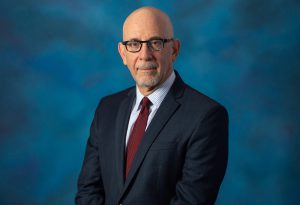 Harris taught at the UToledo College of Law from 1990 to 2007, where he was the Eugene N. Balk Professor of Law and Values.
Harris taught at the UToledo College of Law from 1990 to 2007, where he was the Eugene N. Balk Professor of Law and Values.
Harris teaches, writes and speaks about the law, policing and the American criminal justice system. His research focuses on search and seizure law, police conduct, and the intersection of race and criminal justice.
For more than two decades, Harris has been the nation’s foremost expert on racial profiling. His research and publications became the basis for the first proposals in Congress to curb racial profiling and led to laws and regulations against profiling in more than half the states and hundreds of police departments.
Harris frequently works with national, state and local governments and non-governmental organizations across the country to improve the quality of police work, with a special emphasis on bridging the gap between police and the communities they serve.
He is the creator and host of the “Criminal Injustice” podcast, which is devoted to issues in the criminal justice system. Harris also is the author of several books, including “A City Divided: Race, Fear, and the Law in Police Confrontations,” which was published by Anthem Press in 2020.
In 2015, Harris received the Jefferson Award for Public Service for his work in Pittsburgh and other communities across the country to create better relationships between police and the communities they serve, particularly Black communities, to bring about both respectful, just policing and public safety.
UToledo to Honor Holocaust Survivor With Book Release Celebration, Endowed Professorship
Tuesday, September 8th, 2020The University of Toledo is honoring the life and legacy of the late Philip Markowicz, a Holocaust survivor who was a cherished member of the Toledo Jewish community.
During the virtual event “An Evening in Honor of Philip Markowicz” at 4 p.m. Sunday, Sept. 13 on Zoom, UToledo and Markowicz’s children will celebrate the release of his book recently published by The University of Toledo Press titled “Losing God in Translation: A Study of the Hebrew Bible” and announce an endowed professorship in Judaism and Jewish Biblical Studies established in his name.
Register for the virtual event at the UToledo College of Arts and Letters website.
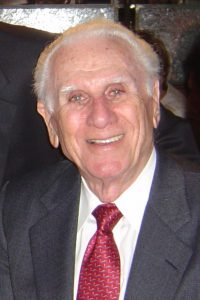
Philip Markowicz
“The University of Toledo College of Arts and Letters is grateful for Mr. Markowicz’s many contributions to this community and the generous gift his family has made to establish the Philip Markowicz Endowed Professorship in Judaism and Jewish Biblical Studies,” Charlene Gilbert, dean of the College of Arts and Letters, said. “This gift serves as a permanent testament to the scholarship he sought to pursue before his dreams of being a biblical scholar were destroyed by the brutality of the Nazi invasion of Poland.”
Markowicz’s children, Dr. Allen Markowicz and Professor Sylvia Markowicz Neil, together with their spouses Hindea Markowicz and Daniel Fischel, have for the past decade supported a UToledo faculty position in Jewish studies. They and others in the community donated more than $250,000 to fund the new endowed faculty position in Markowicz’s name, and the family will match additional contributions up to $125,000.
“This gift has been fundamental in supporting our efforts to increase our offerings in the study of Judaism and to continue Philip Markowicz’s legacy of scholarship of the Hebrew Bible,” Dr. John Sarnecki, chair of the Department of Philosophy and Religious Studies, said.
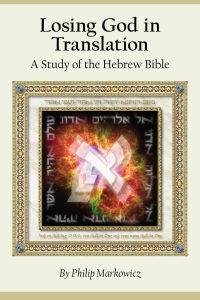 The event also will feature a keynote lecture by Dr. Yonatan S. Miller, assistant professor of religious studies and the new Philip Markowicz Endowed Assistant Professor who also prepared and edited Markowicz’s new book.
The event also will feature a keynote lecture by Dr. Yonatan S. Miller, assistant professor of religious studies and the new Philip Markowicz Endowed Assistant Professor who also prepared and edited Markowicz’s new book.
Markowicz was born in 1924 in Przerab, Poland. The son of a rabbi, Markowicz was known as a Talmud prodigy but his yeshiva education was interrupted by the Nazi invasion of Poland.
He survived the ghetto of Lodz, several concentration camps including Auschwitz, and a death march. Nazis murdered his entire family with the exception of his brother.
After being liberated by the Allies, Markowicz met and married his wife, Ruth, in a Displaced Persons camp and started their family and emigrated to Toledo, where – with no connections or resources – Markowicz trained himself in electronics and created a thriving business.
Philip continued his passion for Torah study and wrote extensively in his retirement. He published an autobiography, “My Three Lives,” in 2010, and completed the manuscript for “Losing God in Translation” shortly before he died in 2017.
The publication of his new book inaugurates a new series from The University of Toledo Press with the imprint of the University’s Center for Religious Understanding.
UToledo Students Host Dialogue on Diversity to Discuss Black Lives Matter Movement
Wednesday, September 2nd, 2020The University of Toledo is continuing its Dialogues on Diversity series with a conversation organized and hosted by students.
The next virtual town hall in the series titled “Black Students Matter: Finding Our Way in the Revolution” will take place 5:30 p.m. Thursday, Sept. 3 and can be accessed on WebEx using the access code 172 033 9974. The meeting password is DoD7. Join by phone at 415.655.0002.
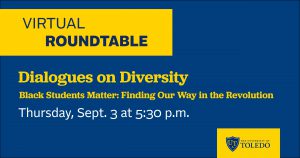 The discussion will be moderated by Emir Moore, UToledo graduate student in the Master of Business Administration program and graduate assistant for the Office of Diversity and Inclusion, with participants including:
The discussion will be moderated by Emir Moore, UToledo graduate student in the Master of Business Administration program and graduate assistant for the Office of Diversity and Inclusion, with participants including:
- Tulani Black, president of the Association for the Advancement of African American Women;
- Anthony Gennings, student trustee on the UToledo Board of Trustees;
- Dominga Grace, organizer of Toledo Together; and
- Nadia Shelton, president of the National Panhellenic Council.
“Since students are back on campus and settled into the fall semester, we thought that it was important to provide a platform for students’ voices to be heard,” Moore said. “This conversation will provide student leaders an opportunity to share their thoughts on the Black Lives Matter movement and racial equity in our society and on our campus.”
This is the seventh in a series of recent virtual Dialogues on Diversity since George Floyd was killed in Minneapolis by a police officer, sparking protests against systemic racism across the country.
UToledo Astronomer Awarded NSF Grant To Study Role of Galactic Winds in Galaxy Evolution
Tuesday, September 1st, 2020An astronomer at The University of Toledo is combining several techniques to take a high-precision look at how our Milky Way and other galaxies formed and changed after the Big Bang billions of years ago.
The National Science Foundation awarded Dr. Anne Medling, assistant professor in the Department of Physics and Astronomy, a three-year, $332,964 grant to study the way gas — the fundamental building blocks of stars — gets blown out of galaxies by strong winds.
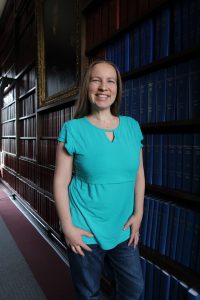 The scientist will use resolved spectroscopy – splitting the light from a galaxy into many different colors – to track the causes and effects of galactic winds, which are driven by black holes and star formation.
The scientist will use resolved spectroscopy – splitting the light from a galaxy into many different colors – to track the causes and effects of galactic winds, which are driven by black holes and star formation.
As part of the project, Medling’s team also will use their research to develop a public show for the UToledo Ritter Planetarium, titled “The Secret Lives of Galaxies,” which also will be available to other planetariums around the world in both English and Spanish.
“Extreme winds driven by bursts of star formation or active supermassive black holes can eject gas from a galaxy, but weaker galactic winds are more prevalent and their long-term impacts on galaxy evolution may be significant,” Medling said. “Our method allows us to detect those weaker winds.”
Medling will use the Sydney-Australian Astronomical Observatory Multi-object Integral-Field Spectrograph Galaxy Survey data to identify gas outflows and quantify the effects of winds on their host galaxies using a 3D shock diagnostic that can trace gas outflows up to two orders of magnitude weaker than standard methods.
Those data will be linked with near-infrared observations using the Rapid Infrared Imager Spectrometer on the Lowell Discovery Telescope in Arizona and molecular gas observations using the Atacama Large Millimeter/submillimeter Array in Chile.
The combined datasets will provide three independent tracers of shocked gas: optical emission, near-infrared molecular hydrogen lines and carbon monoxide emission.
“By looking at so many galaxies at this level of detail, our team will study how galaxies move from youth – blue and star-forming – into their old age – red and no longer able to form new stars,” Medling said.
UToledo to Host Ribbon-Cutting Ceremony For New Solar Array on Health Science Campus
Thursday, August 20th, 2020A new 2.3-acre, 337-kilowatt solar array on Health Science Campus is expected to save The University of Toledo nearly $30,000 a year while increasing the amount of renewable energy powering the University.
A ribbon-cutting ceremony for the HSC Tech Park Solar Field will be 10 a.m. Tuesday, Aug. 25 at its location off of Arlington Avenue along Main Technology Drive near the Facilities Support Building. Parking is in lot 44E.
 “The solar field project is complete and we are working with a local utility provider to get the field operational and tied into the grid,” Jason Toth, senior associate vice president for administration, said. “This work represents a unique collaboration between students, faculty, an outside donor and UToledo to support sustainability on our campus.”
“The solar field project is complete and we are working with a local utility provider to get the field operational and tied into the grid,” Jason Toth, senior associate vice president for administration, said. “This work represents a unique collaboration between students, faculty, an outside donor and UToledo to support sustainability on our campus.”
First Solar, one of the world’s largest manufacturers of solar cells and a company with deep ties to UToledo, donated 365 kilowatts of its Series 5 modules valued at $192,000 to the University in 2017. Approximately 10% of the donated modules are being reserved for maintenance.
A senior design team made up of UToledo students studying mechanical, industrial and manufacturing engineering worked with UToledo Facilities and Construction to identify the site and prepared construction engineering drawings with assistance from JDRM Engineering. The UToledo Student Green Fund approved spending $350,000 to cover the costs to install the array. The construction contract was awarded to Solscient Energy LLC after a public bidding of the project.
The projected electrical production over the 25-year life of the system will be more than $700,000, enough to power about 60 homes annually.
“The University of Toledo continues to reduce its carbon footprint and strengthen its commitment to a clean energy future,” said Dr. Randy Ellingson, professor in the Department of Physics and Astronomy. “Thanks to First Solar’s generous donation of modules and UToledo working to keeping costs down, the array will produce some of the lowest cost solar energy in the state of Ohio. We are excited to connect our students to these solar projects. They gain valuable experience with this fast-growing energy technology that generates nearly carbon-free electricity directly from sunlight.”
Based on avoided combustion of fossil fuels, the array will prevent the release of approximately 6 million kilograms of carbon dioxide while generating approximately 10.5 gigawatt hours of clean electricity for Health Science Campus.
A portion of the value of the electricity generated will go to a UToledo fund for use on future renewable energy projects.
Building on its more than 30-year history advancing solar technology to power the world using clean energy, UToledo researchers are pushing the performance of solar cells to levels never before reached.
Last year, the U.S. Department of Energy awarded UToledo $4.5 million to develop the next-generation solar panel by bringing a new, ultra-high efficiency material called perovskites to the consumer market.
The U.S. Air Force also awarded UToledo physicists $7.4 million to develop solar technology that is lightweight, flexible, highly efficient and durable in space so it can provide power for space vehicles using sunlight.
Plus, the U.S. Department of Energy last year awarded UToledo physicists $750,000 to improve the production of hydrogen as fuel, using clean energy – solar power – to split the water molecule and create clean energy – hydrogen fuel.
These activities involve collaboration with U.S. Department of Energy national laboratories, U.S. companies and universities, and enable the UToledo Wright Center for Photovoltaics Innovation and Commercialization to continue strong international leadership in the field of solar electricity generation.
Dialogue on Diversity to Address Intersection of LGBTQIA+, Black Lives Matter
Wednesday, August 19th, 2020The University of Toledo is continuing its Dialogues on Diversity series with a conversation on the complexity of identities, what that means for agendas of justice movements, and how they can be effective allies for each other.
The next virtual town hall in the series titled “ALL Black Lives Matter: An LGBTQIA+ Dialogue” will take place 5:30 p.m. Thursday, Aug. 20 and can be accessed on WebEx using the access code 160 849 0975. The meeting password is DoD6. Join by phone at 415.655.0002.
The discussion will be moderated by Sheena Barnes, executive director of Equality Toledo, with participants including:
- Dr. Sharon Barnes, associate professor and chair of the UToledo Department of Women’s and Gender Studies;
- Veralucia Mendoza, regional field manager at Planned Parenthood Advocates of Ohio;
- LaVelle Ridley, a 2016 UToledo alumnus who is a Ph.D. candidate in women’s studies at the University of Michigan; and
- Dr. Michele Soliz, UToledo associate vice president for student success and inclusion.
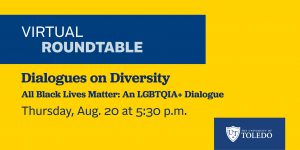 “To assert that ALL Black lives matter is a way to highlight the diversity inside African-American communities and advocate for the liberation of all: queer, female, immigrant, transgender, non-Christian or having a disability,” Barnes said. “For me, it means working always for a deeper and broader understanding of multiple and intersecting sites of oppression, especially the ingrained and difficult to upend white supremacy in our culture. I believe supporting the Black Lives Matter movement is a way to support ending all oppression, with a necessary emphasis on racial oppression.”
“To assert that ALL Black lives matter is a way to highlight the diversity inside African-American communities and advocate for the liberation of all: queer, female, immigrant, transgender, non-Christian or having a disability,” Barnes said. “For me, it means working always for a deeper and broader understanding of multiple and intersecting sites of oppression, especially the ingrained and difficult to upend white supremacy in our culture. I believe supporting the Black Lives Matter movement is a way to support ending all oppression, with a necessary emphasis on racial oppression.”
UToledo Student Awarded International Research Grant to Study Black Urban Agricultural Experience
Tuesday, August 11th, 2020A graduate student at The University of Toledo was awarded a competitive grant to look at land use and barriers to urban agriculture in Toledo and Dayton and how it impacts African-American communities.
Brittany D. Jones, a Ph.D. candidate in the UToledo Spatially Integrated Social Science Doctoral Program in the College of Arts and Letters, is one of four winners of a 2020 MAXQDA Research for Change Grant from VERBI Software and the Global Nature Fund.
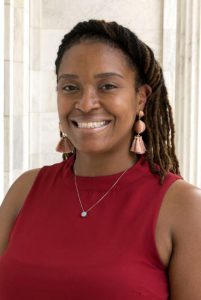 Her research project is titled “Empowerment Through Consumption: Land Banks, Land Ownership and Black Food Geographies.” Her co-advisors are Dr. Neil Reid and Dr. Sujata Shetty, professors in the UToledo Department of Geography and Planning.
Her research project is titled “Empowerment Through Consumption: Land Banks, Land Ownership and Black Food Geographies.” Her co-advisors are Dr. Neil Reid and Dr. Sujata Shetty, professors in the UToledo Department of Geography and Planning.
Jones will explore the urban agricultural experience and Black foodways in Toledo and Dayton, two Ohio cities that saw a large influx of African Americans during the Great Migration. They are also legacy cities, meaning they lost a significant amount of population and economic viability after the decline of manufacturing in the region.
In recognizing Jones as a grant recipient, VERBI noted, “We were greatly impacted by Mrs. Jones’ story and how her life history has inspired her to pursue food system and sovereignty studies. With her project, she aims to uncover racialized hypocrisies embedded within both the local and global food system, which is now as relevant as ever. Mrs. Jones is a first-generation Ph.D. student in her family, and we are glad to be able to support her.”
Jones said in her master’s program, she began to fully understand the nutritional problems of the world she grew up in were rooted in systemic causes. In applying for the grant, Jones said she hopes her work will not only suggest solutions, but improve research methodology.
“Research for change means more than just finding solutions to a complex problem, [it] embodies the [grassroots] efforts of providing resources and realistic methods that can be easily replicated and adapted, all the while acknowledging cultural differences/expectations, which is crucial to long-term change,” Jones said.
Dr. Beth Schlemper, associate professor in the UToledo Department of Geography and Planning, said she believes Jones’ doctoral course work helped her win the grant.
“It makes me happy because I taught the Ph.D. students, who took advanced qualitative methods for spatially integrated social science students, how to use MAXQDA [research software], and she was inspired to use the software in her research methods and apply for this grant.”
Jones agreed: “The skills I acquired through my degree program have allowed me to confidently apply for opportunities best fit for my research. It has taught me that, as a doctorate student, you are the CEO of your degree and must stand in your truth as a contributor to universal knowledge, especially as a scholar of color.”
The $1,600 grant includes a two-year student subscription to MAXQDA Analytics Pro software, two online trainings with certified MAXQDA trainers, a registration waiver to the MAXQDA International Conference in Berlin, and full tech support. In addition, Jones’ research will receive international exposure through MAXQDA promotions.
“This software is highly used to fully integrate qualitative data analysis into your research and is especially popular with mixed methods researchers,” said Jones, who is a graduate research assistant in the University’s Jack Ford Urban Affairs Center and president of the UToledo Graduate Student Association.
Read more about Jones’ research project on the MAXQDA website.
Dialogue on Diversity to Address Role of Black Women in Movements Toward Equity
Wednesday, August 5th, 2020The University of Toledo is continuing its Dialogues on Diversity series with a conversation on the role of Black women and non-Black allies in movements toward equity in the U.S.
The next virtual town hall in the series titled “Sister Circle: Resistance and Resilience, Then and Now” will take place 5:30 p.m. Thursday, Aug. 6 and can be accessed on WebEx using the access code 160 061 5758. The meeting password is DoD:5Sister. Join by phone at 415.655.0002.
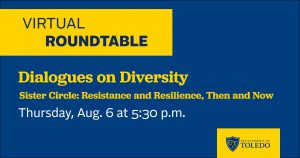 The discussion to be moderated by Malaika Bell, program manager in the UToledo Office of Diversity and Inclusion, is an invitation for the public to join a meeting of the Sister Circle, a group of diverse women from both Main Campus and Health Science Campus who have been meeting weekly for the past several months to promote positivity.
The discussion to be moderated by Malaika Bell, program manager in the UToledo Office of Diversity and Inclusion, is an invitation for the public to join a meeting of the Sister Circle, a group of diverse women from both Main Campus and Health Science Campus who have been meeting weekly for the past several months to promote positivity.
“During our next meeting of the Sister Circle, we invite the community to participate in a conversation about the role that Black women have played in movements toward equity in our nation, how we can truly practice radical self-care, and what we want from our non-Black allies,” Bell said.
Participants will be:
- Charlene Gilbert, dean of the College of Arts and Letters;
- Monica Holiday-Goodman, associate dean for Health Science Campus Student Affairs and Diversity, and professor of pharmacy practice; and
- Tinola Mayfield-Guerrero, immersed vocational rehabilitation counselor in partnership with UToledo.
This is the fifth in a series of recent virtual Dialogues on Diversity in the more than two months since George Floyd was killed in Minneapolis when a police officer knelt on his neck for nearly nine minutes, sparking protests against systemic racism across the country.
Third Campus Conversation After George Floyd’s Death to Focus on Response of Black Men
Wednesday, July 8th, 2020The University of Toledo’s third campus conversation after the death of George Floyd will feature insight from a panel of African-American men.
The Dialogues on Diversity Virtual Town Hall series continues at 5:30 p.m. Thursday, July 9 with “Black Men Respond to the Killing of George Floyd, Black Lives Matter and Racism” hosted jointly by the Office of Diversity and Inclusion and Brothers on the Rise.
The free, public event can be accessed on WebEx using the access code 160 804 1384. The meeting password is knYq2a8mta7. Join by phone at 415.655.0002.
“Black men have been impacted by racism and violence for generations,” David Young, UToledo director of Toledo Excel and special projects, and moderator of the discussion, said. “We hope to have a frank and honest discussion with a panel of Black men from a variety of backgrounds, each lending their unique viewpoints. At the same time, it is our hope to begin exploring some solutions.”
Participants also include:
- Demond Pryor, director of UToledo Recreational Services;
- Dr. Jean Paul Amegee, UToledo assistant professor of emergency medicine and University alumnus;
- Kush Baxter, UToledo student;
- James Townsend, clinical counselor at the UToledo Counseling Center; and
- Justin Ingram, UToledo assistant men’s basketball coach.
UToledo is a community that celebrates and respects people of all backgrounds and experiences. As an institution, we remain committed to building an inclusive environment free of racism, sexism, bigotry and other negative influences.

